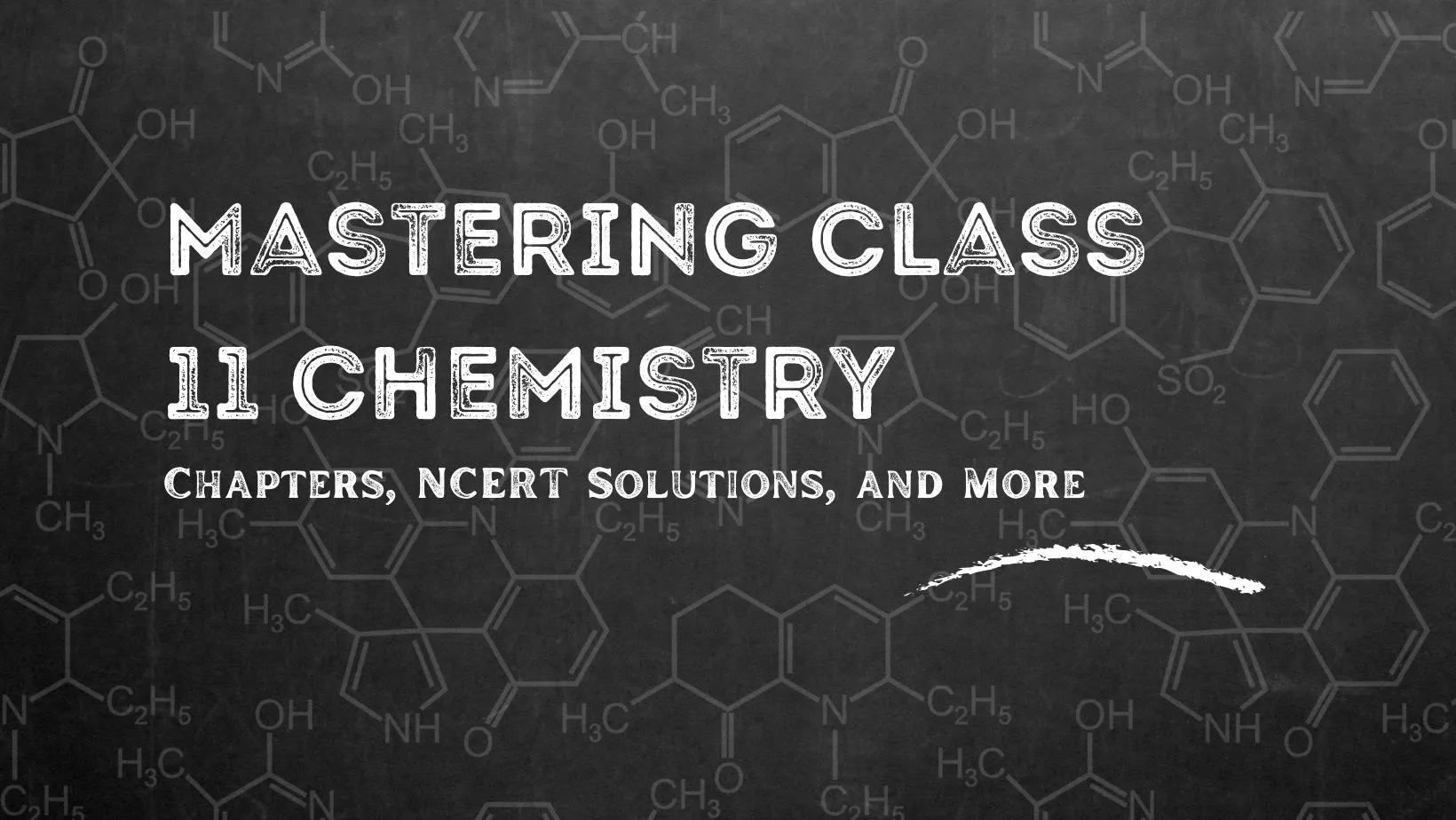Introduction
Class 11 Chemistry, often considered a gateway to the fascinating world of science, serves as a pivotal point in a student’s academic journey. This stage is where the fundamental principles of chemistry take root and set the stage for more advanced concepts in Class 12 and beyond. In this comprehensive guide, we will delve deep into the Class 11 Chemistry syllabus, explore the importance of NCERT solutions, and provide answers to frequently asked questions to help you navigate this critical academic phase successfully.
Understanding Class 11 Chemistry
Class 11 Chemistry is more than just another school subject; it’s a journey of discovery and understanding of the composition, properties, and transformations of matter. As you step into this class, you’re embarking on a path that will not only shape your understanding of science but also lay the groundwork for a plethora of career opportunities. Let’s begin our exploration by dissecting the chapters covered in Class 11 Chemistry.
Chapters Covered in Class 11 Chemistry (Expanded)
States of Matter:
-
- States of matter, a fundamental concept in chemistry, come to life in this chapter. It explores the behavior of gases, liquids, and solids in-depth. You’ll gain insights into the ideal gas equation, real gases, the van der Waals equation, and deviations from ideal behavior. Understanding these concepts is crucial as they play a pivotal role in various scientific applications.
Thermodynamics:
-
- Thermodynamics takes center stage as you embark on a journey into energy changes and the laws governing them. Delve deeper into topics such as enthalpy, entropy, Gibbs free energy, and spontaneous processes. These principles extend far beyond the classroom, with applications in fields as diverse as chemical engineering and environmental science.
Equilibrium:
-
- Equilibrium, a concept you’ve touched upon earlier, gets a comprehensive treatment in this chapter. Explore the equilibrium constant, Le Chatelier’s principle, and factors influencing chemical equilibrium. Equilibrium plays a vital role in understanding chemical reactions, making this chapter a cornerstone in your chemical education.
Redox Reactions:
-
- Redox reactions, where electrons change hands, are at the heart of chemical transformations. Dive deep into balancing chemical equations, understand oxidation states, and explore electrochemical cells. Your grasp of redox reactions will not only enhance your chemistry knowledge but also find applications in everyday life, from batteries to corrosion control.
Hydrogen:
-
- Hydrogen, the lightest and most abundant element, merits its own chapter. Beyond its role in water, hydrogen is essential in various industrial processes, fuel cells, and even potential future energy solutions. Learn about different methods of hydrogen production, its isotopes, and applications that extend far beyond the laboratory.
The s-Block Elements:
-
- The s-block elements, which include alkali and alkaline earth metals, form the basis for understanding chemical reactivity and periodic trends. Explore their properties, occurrence in nature, and applications, which range from medical treatments to fireworks.
The p-Block Elements:
-
- As you move to the p-block elements, the diversity of chemistry truly unfolds. Dive into elements like boron, carbon, nitrogen, and beyond. Understand their properties, occurrence, and industrial uses. This chapter sets the stage for understanding organic chemistry, where carbon takes center stage.
Organic Chemistry – Some Basic Principles and Techniques:
-
- Organic chemistry, the chemistry of carbon compounds, marks a significant shift in your studies. This chapter introduces you to the world of organic molecules, including nomenclature, structural isomerism, and various methods for purification and qualitative analysis. Organic chemistry is integral to fields like pharmaceuticals, polymers, and petrochemicals.
Hydrocarbons:
-
- Building on your organic chemistry foundation, you’ll now explore hydrocarbons in detail. Alkanes, alkenes, alkynes, and aromatic hydrocarbons take the spotlight. Understanding their structures, nomenclature, and properties is pivotal, as these compounds form the basis of all organic chemistry.
Environmental Chemistry:
-
- Your chemistry journey concludes with a critical examination of the environment. Environmental chemistry is more relevant today than ever, with discussions on pollution, climate change, and sustainability at the forefront. Learn about environmental pollutants, greenhouse gases, and the strategies and technologies employed to combat environmental issues.
The Significance of Class 11 Chemistry NCERT Solutions
While navigating the intricate terrain of Class 11 Chemistry, students often seek guidance and support. This is where NCERT solutions come into play. These solutions, designed to complement your textbooks, offer detailed explanations and step-by-step solutions to exercises and questions. Here’s why they are indispensable:
- Clarity and Understanding: NCERT solutions provide clarity on complex concepts, making it easier for students to understand the subject matter.
- Enhanced Problem-Solving Skills: By working through the solutions, students sharpen their problem-solving skills, a valuable asset not only in chemistry but in many other fields.
- Exam Preparation: NCERT solutions are instrumental in exam preparation, helping students practice and excel in assessments and competitive exams.
- Complete Coverage: These solutions ensure that students cover all the essential topics and exercises outlined in the NCERT textbooks, leaving no knowledge gaps.
- Self-Paced Learning: They enable self-paced learning, allowing students to revisit concepts and questions at their own convenience.
Accessing NCERT solutions for Class 11 Chemistry is easy, as they are readily available online or at local bookstores. Utilizing these resources can significantly boost your understanding of the subject.
How Many Chapters in Chemistry Class 11?
Class 11 Chemistry comprises a total of 14 chapters, each serving as a building block in your chemical knowledge. These chapters collectively form a comprehensive framework that equips you with the skills and insights necessary to tackle advanced chemistry topics in the future. It’s vital to give each chapter the attention it deserves, as they all contribute to a robust foundation.
Frequently Asked Questions (Expanded)
What Is the Importance of Class 11 Chemistry?
-
- Class 11 Chemistry holds immense importance as it establishes the foundation for more advanced topics in Class 12 and provides essential knowledge for future careers in science, engineering, medicine, and related fields. It helps develop critical thinking and problem-solving skills applicable in various contexts.
How Can NCERT Solutions Benefit Students in Class 11 Chemistry?
-
- NCERT solutions are invaluable resources that provide clarity on complex topics, enhance problem-solving abilities, facilitate exam preparation, ensure comprehensive coverage of the curriculum, and enable self-paced learning. Their utility extends to both understanding concepts and acing exams.
Which Chapter Should I Focus on First?
-
- Starting with “Some Basic Concepts of Chemistry” is advisable, as it sets the stage by introducing fundamental principles and terminology. However, your choice may also depend on personal preferences and areas of interest.
How Can I Make the Most of Class 11 Chemistry?
-
- To maximize your learning experience, maintain consistent study habits, practice regularly, seek guidance when needed, connect theoretical concepts to real-world applications, and remain curious about the subject. Engaging in hands-on experiments, where possible, can also enhance your understanding.
What Career Paths Open Up with a Strong Foundation in Class 11 Chemistry?
-
- A strong foundation in Class 11 Chemistry opens doors to a myriad of career paths. These include pursuing degrees in chemistry, chemical engineering, medicine, pharmacy, environmental science, materials science, and more. Chemistry is the bedrock of several scientific disciplines, making it a versatile field of study.
By diligently studying the expanded chapters and addressing additional frequently asked questions, you are better equipped to navigate the complexities of Class 11 Chemistry. As you embark on this academic journey, remember that curiosity and a thirst for knowledge are your greatest allies. The world of chemistry is vast and endlessly fascinating, waiting for you to explore its mysteries and applications. Happy learning and may your passion for chemistry continue to grow!
Conclusion
Class 11 Chemistry is not just a subject; it’s a transformative experience. Each chapter contributes to your knowledge base, shaping you into a competent student of science. By harnessing the power of NCERT solutions, practicing diligently, and staying curious, you’ll pave the way for success not only in your current academic journey but in any future scientific pursuits you undertake. Embrace the beauty of chemistry, and may your pursuit of knowledge be as limitless as the elements themselves. Happy learning!
Powered by thinkIIT




